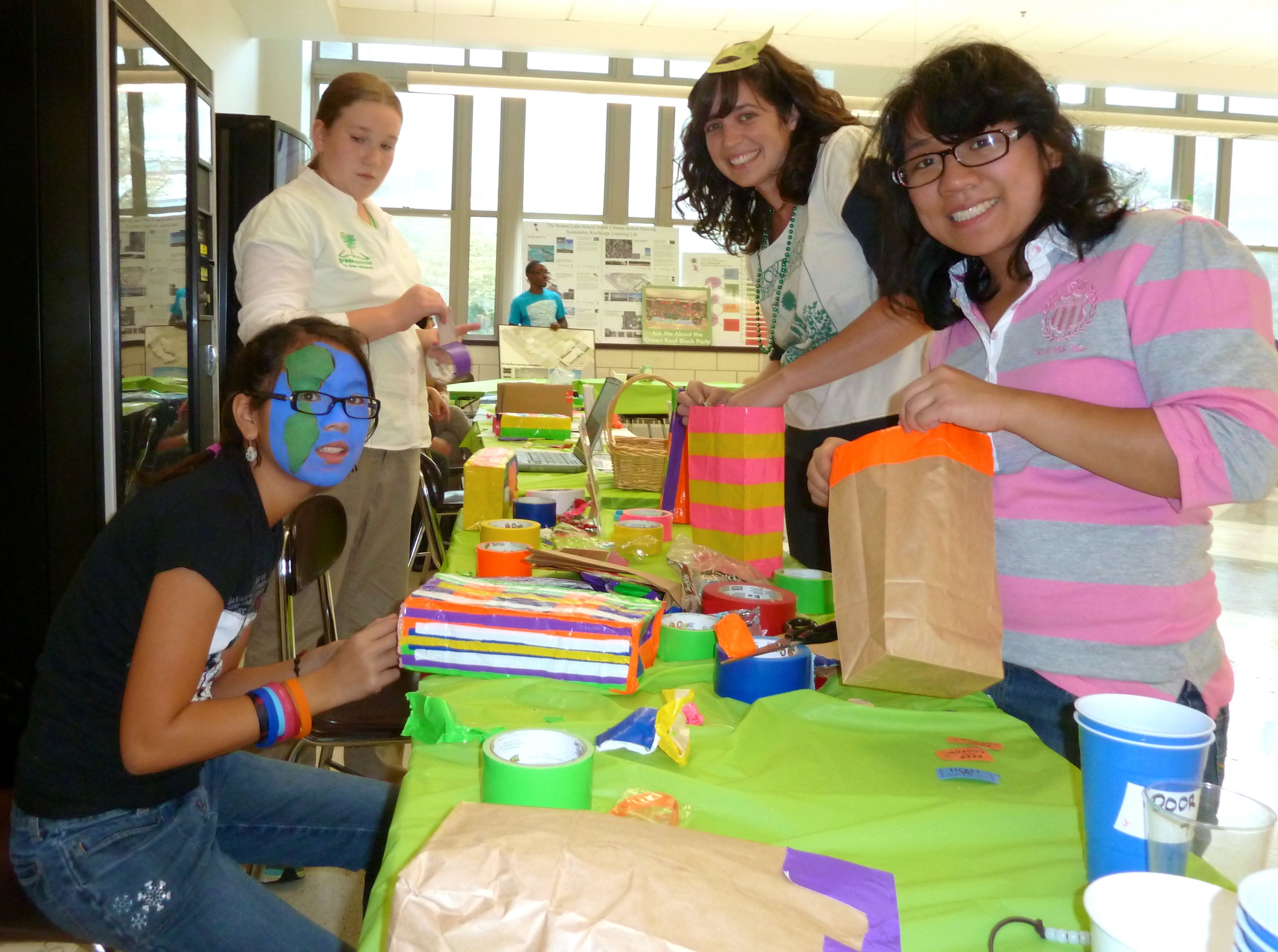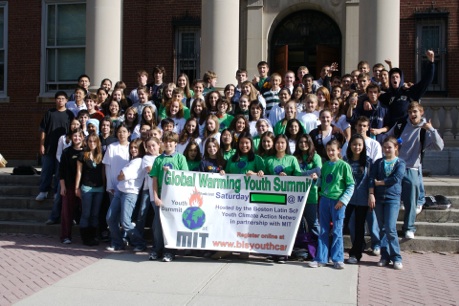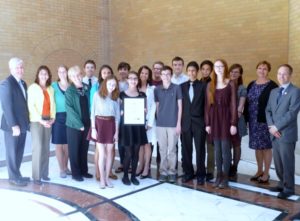Boston Latin School wins the 2014 Green Ribbon Award
The US Department of Education has named the Boston Latin School (BLS) a Green Ribbon School for its comprehensive environmental, health and social justice initiatives that students spread not just at the school but throughout the community. On Tuesday, May 6th, BLS was recognized for their award by local leaders including Energy and Environmental Affairs (EEA) Secretary Rick Sullivan.
“We are proud to recognize the students, teachers and nonprofits raising awareness about energy and environmental issues affecting Massachusetts and the planet,” said Secretary Sullivan. “The ideas, research and knowledge being recognized today show the forward-thinking of our youth and how ready they are for the challenges ahead.”
Boston Latin School is the only school in Massachusetts to receive the Green Ribbon Award this year. Nationally, 48 schools were named Green Ribbon Schools. Boston Latin School, founded in 1635, is the oldest public school in the country, and the largest school in the Boston Public School district, serving 2,400 students in grades 7-12.
 Seven years ago BLS students founded the Youth Climate Action Network, or YouthCAN, which has grown into a very active after-school club that practices sustainability at the school and throughout the community- resulting in powerful youth leadership, sweeping facilities and school-wide curriculum changes, extensive outreach and partnerships, and community service that is unparalleled in the region.
Seven years ago BLS students founded the Youth Climate Action Network, or YouthCAN, which has grown into a very active after-school club that practices sustainability at the school and throughout the community- resulting in powerful youth leadership, sweeping facilities and school-wide curriculum changes, extensive outreach and partnerships, and community service that is unparalleled in the region.
“Boston Latin School is committed to promoting sustainability in our school and broader community. We are honored to receive the US Department of Education’s Green Ribbon School recognition of our success and leadership with regard to implementing green schools initiatives,” said Cate Arnold, History Teacher and YouthCAN Advisor.
The U.S. Department of Education Green Ribbon Schools (ED-GRS) recognition award honors schools and districts that are exemplary in reducing environmental impact and costs; improving the health and wellness of students and staff; and providing effective environmental and sustainability education, which incorporates STEM, civic skills and green career pathways. The recognition award is part of a larger U.S. Department of Education (ED) effort to identify and disseminate knowledge about practices that are proven to result in improved student engagement, higher academic achievement and graduation rates, and work-force preparedness, as well as a government wide goal of increasing energy independence and economic security.
BLS students and staff are working toward education for sustainability – engaging youth in hands-on learning opportunities that build environmental literacy, develop critical thinking skills, and benefit the community. YouthCAN has conducted sustainability education and outreach in the community, maintaining numerous partnerships with youth organizations, academic institutions, businesses, and public officials in the Greater Boston area. Students organize free sustainability events that serve dozens of schools and organizations in the community every year, including a Climate Summit that brings hundreds of youths together to learn about and take action on issues such as transportation access, water conservation, and food systems.
A few of the examples of the hands-on learning components for which students have fundraised and implemented at the school include outdoor raised vegetable gardens, student-designed rain catchment-systems, rooftop weather stations, a SAGE vertical garden in the cafeteria, a rooftop solar array, a state-of-the-art hydroponic vegetable farm, a $75,000 energy lighting retrofit saving 200,000 kWh of energy per year, and a Lucid real-time building energy dashboard. 
In addition to technology and infrastructure improvements, YouthCAN has initiated educational and health programs for teachers and students alike. The school’s Farm to School program reaches 2,400 students every Thursday with local food, green bean costumes, promotional t-shirts, and more.
The club also has launched a school-wide “Get Informed” speaker series to raise awareness and improve health. Two sustainability-focused professional-development programs reached 50 educators and resulted in new sustainability lesson plans for schools across Massachusetts. The BLS’ Annual Teach-In has tripled student demand for environmental courses, and ensured that sustainability education is incorporated into all grades and across disciplines. In addition, for the past three summers BLS has helped host and fund the Summer Green Jobs Energy Audit program, resulting in youth-led energy audits at high schools around Boston. In 2012, participants were eligible for energy-saving retrofit funds for their school.
What is unique about BLS is that the students themselves are driving all of this work. Students in YouthCAN manage their own communications and outreach, and, to date, have produced over 65 unique videos. Students have presented on local and national broadcasts, including the “Today” show, and manage a website for sharing best practices. The students have written dozens of their own grants, and have been successful in raising $320,000 to fund various sustainability initiatives.
“Today’s honorees are modeling a comprehensive approach to being green by encompassing facility, wellness and learning into their daily operations,” said U.S. Secretary of Education Arne Duncan. “They are demonstrating ways schools can simultaneously cut costs, improve health, and engage students with hands-on learning that prepares them with the thinking skills necessary to be successful in college and careers.”
 The largest and most ambitious project that the students are leading, with support from alumni, teachers, and the community, is the Rooftop Sustainability Learning Laboratory. This innovative project proposes to build a state of-the-art community green roof at BLS, where students and educators from across the city — and world — will come to learn how to think in terms of the world’s interconnected systems. The project will feature a rooftop garden, outdoor classrooms, and technologies and curriculum to promote STEM learning. The design for this shared facility was created by students who have been working with local architects and engineers for over four years to envision a space where students and educators alike can learn in an exciting facility that — literally — educates by design.
The largest and most ambitious project that the students are leading, with support from alumni, teachers, and the community, is the Rooftop Sustainability Learning Laboratory. This innovative project proposes to build a state of-the-art community green roof at BLS, where students and educators from across the city — and world — will come to learn how to think in terms of the world’s interconnected systems. The project will feature a rooftop garden, outdoor classrooms, and technologies and curriculum to promote STEM learning. The design for this shared facility was created by students who have been working with local architects and engineers for over four years to envision a space where students and educators alike can learn in an exciting facility that — literally — educates by design.
As a result of the dedicated work and creative energy of the YouthCAN student leaders, BLS has received many awards, including the President’s Environmental Youth Award, an EPA Merit Award, and the Eco Schools USA’s Green Flag Award. Most recently BLS won Global Green’s 2013 Green School Makeover Competition contest, bringing $75,000 to the school to invest in GreenSTEM technologies. Each makeover element, such as the SAGE garden wall and a Freight Farm, provides deliberate teaching opportunities for the faculty, and student leadership opportunities to manage and maintain the systems.
The Green Makeover and now the honor of receiving the Green Ribbon Award, represents a critical tipping point in a powerful story of youth leadership and community service. BLS is advancing an important model of education for sustainability that has the potential to affect the rest of Boston’s schools and others beyond Boston.
Learn more about the Green Ribbon Schools, and read more about the work at Boston Latin School and the other 2014 Green Ribbon Schools. If you’re interested in being nominated for a Green Ribbon School award, please contact Lauren Greene, Program Coordinator, Massachusetts Department of Elementary and Secondary Education.

Freight Farm-to-School | Blog | Freight Farms
October 29, 2014 @ 9:24 AM
[…] past spring, BLS was recognized by the US Department of Education and named a Green Ribbon School for their “comprehensive environmental, health and social justice initiatives that students […]
Boston Latin’s New Take on Farm To School |
October 29, 2014 @ 4:16 PM
[…] past spring, BLS was recognized by the US Department of Education and named a Green Ribbon School for their “comprehensive environmental, health and social justice initiatives that students […]